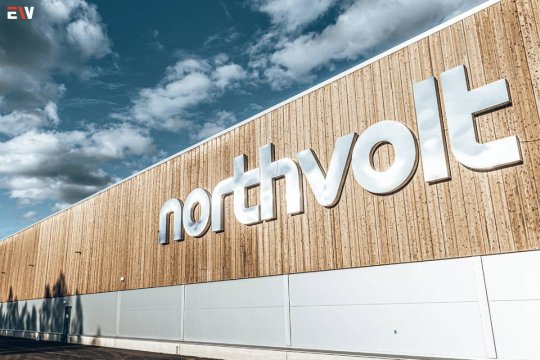#Northvolt
Explore tagged Tumblr posts
Text
“Northvolt transformed in a matter of months from Europe’s best shot at a homegrown electric-vehicle battery champion to a company struggling to stay afloat.”

2 notes
·
View notes
Text
vimeo
La solution, c'est la décroissance.
2 notes
·
View notes
Text
«Китайская» Volvo Cars спасает Northvolt от банкротства.
Вокруг Northvolt в последние время было много слухов. И вот знаковая новость. Volvo Cars спасает Northvolt, покупая её проект «Novo Energy». Northvolt должен быть стать крупнейш��м европейским проектом по производству литиев��х аккумуляторных элементов для европейской же электромобильной отрасли. Но охвативший Европу экономико-энергетический кризис не позволил осуществиться грандиозным планам…
0 notes
Text
Millionen versenkt, #Northvolt bleibt leer, doch #Habeck erklärt: „Das Gutachten? Nicht mehr!“
Zur „Geheimsache“ wird das Scheitern gemacht, damit bloß keiner Fragen dazu entfacht.
Transparenz? Ach nein, die stört nur den Lauf, so rettet man Fehler – und schweigt sie aus.

1 note
·
View note
Link
#AEVEXAerospace#batteryenergystoragesystems#California#Chrysler#EuropeanInvestmentFund#Export-ImportBankoftheUnitedStates#FedEx#Futurride#Honeywell#lithium-sulfurbatteries#lithium-sulfurbattery#lithium-sulfurbatterygigafactory#LuxembourgFutureFund#Lyten#Nevada#Northvolt#PrimeMoversLab#Reno#SanLeandro#SiliconValley#Stellantis#StellantisVentures#supermaterials#sustainablemobility#USEXIM#WalbridgeGroup
0 notes
Text
Европейский производитель батарей для электромобилей Northvolt объявил о банкротстве
Европейский производитель батарей для электромобилей Northvolt объявил о банкротстве

Мир инвестиций в зеленую энергетику столкнулся с тревожной новостью — шведская компания Northvolt, один из ведущих производителей аккумуляторов для электромобилей в Европе, официально подала на банкротство. Это событие стало громким сигналом о нестабильности на рынке, который многие считали быстроразвивающимся и устойчивым к кризисам.
Northvolt был одним из главных символов европейской энергетической независимости, демонстрируя амбиции региона конкурировать с лидерами в сфере производства батарей — китайскими и американскими компаниями. Однако в последние месяцы Northvolt столкнулся с рядом серьёзных трудностей, которые привели к краху.

Сокращение затрат и потери контрактов
Чтобы справиться с резким ростом расходов, компания была вынуждена пойти на непопулярные меры — сокращение рабочих мест и оптимизацию бизнеса. Однако даже столь радикальные шаги не помогли стабилизировать ситуацию. Более того, в июне 2024 года Northvolt потерял контракт с автомобильным гигантом BMW на сумму 2 млрд евро. Этот удар стал одним из ключевых факторов, усугубивших финансовое положение компании.
Проблемы с производственными мощностями
Northvolt так и не удалось наладить производство аккумуляторов в объемах, необходимых для выполнения крупных контрактов. Дефицит продукции значительно подорвал доверие автопроизводителей и инвесторов. Масштабное производство батарей для электромобилей требует значительных капиталовложений и технической компетенции, которых, похоже, компании не хватило.

Медленный рост спроса на электромобил��
Хотя зелёная энергетика и электромобили продолжают набирать популярность, темпы роста спроса оказались ниже ожидаемых. Экономическая нестабильность в Европе, высокие цены на электроавтомобили и проблемы с инфраструктурой зарядных станций сыграли свою роль в торможении рынка.
Давление со стороны Китая
Одним из ключевых факторов стала жёсткая конкуренция с китайскими производителями. Китай контролирует 85% мирового производства аккумуляторов, оставляя европейским и американским компаниям лишь небольшую часть рынка. Китайские предприятия опережают западных конкурентов примерно на 10 лет в области технологий. Это делает их продукцию не только более качественной, но и значительно дешевле, что критично для массового производства.
Потеря одного из ведущих европейских производителей аккумуляторов имеет значительные последствия, как для рынка электрокаров, так и для усилий Европы в достижении климатических целей.

Northvolt был одним из символов амбиций Европы в достижении энергетической независимости и устойчивого развития. Однако его банкротство — это не просто крах отдельной компании, это тревожный сигнал, который указывает на необходимость пересмотра стратегии всего рынка. Без активной борьбы за технологическое лидерство и значительной государственной поддержки Европу ждёт усиление зависимости от Китая.
Тем не менее, события вокруг Northvolt дают возможность для глубокого анализа ошибок и улучшения методов работы. Для инвесторов это также напоминание: даже в таких многообещающих секторах, как зелёная энергетика, вложения требуют оперативного анализа рисков и стратегического мышления.
Форум: https://buy-profit.ru/ ВК: https://vk.com/buyprofitvk Pinterest: https://ru.pinterest.com/BUYPROFITpin/ Телеграмм: https://t.me/buyprofitTg
1 note
·
View note
Text
Avrupa’nın elektrikli hayali kısa mı sürdü? Şirketler bir bir batıyor
Avrupa’nın elektrikli otomobil bataryası üreticisi olan Northvolt battığını açıkladı. Buna göre operasyonların değişeceği belirtildi. Avrupa’nın elektrikli araç devrimine öncülük etme iddiasında olan İsveçli batarya üreticisi Northvolt, beklenmedik bir hamleyle sektörü şaşırttı. Şirketin operasyonlarını kapatmaya karar verdiği verildi. Avrupalı batarya üreticisi Northvolt battı İsveçli batarya…
0 notes
Text
Crisis-hit EV battery maker Northvolt struggles to meet production targets
Northvolt failed to meet plans by curtailing production at its battery cell plant in northern Sweden, according to Reuters.
Since early September, the company has consistently failed to meet weekly battery production targets deemed good enough to deliver to customers, according to two unpublished documents.
The documents state a target of 51,000 cells delivered in one week by the end of 2024. However, Northvolt said in response to the appeal that the targets were set on 5 September and were “long out of date.” The company also did not specify its current production targets, which it said were based on contracted customer deliveries.
Hailed as Europe’s best chance to weaken China’s overwhelming dominance of the electric vehicle (EV) battery market, Northvolt laid off a fifth of its global workforce and cut its operations in September to stay afloat. The Swedish company, headed by former Tesla executive Peter Carlsson, has yet to turn a profit.
Northvolt is discussing the possibility of filing for Chapter 11 bankruptcy protection in the US. The company lost a €2 billion ($2.1 billion) contract with BMW in June due to delays in deliveries and its inability to produce sufficient volumes of high-quality batteries.
The plan is currently under review based on the execution of our strategic review, which has influence on the way we operate our main facility Northvolt Ett.
The company publicly launched the strategic review in July and began publishing the results from 9 September. The main actions taken as part of the review included adjusting customer orders and reducing shifts.
This is a very challenging industry. However, we have made great progress through this year, to the point that today we are consistently, week-on-week producing high-performance cells for our customers.
In September, Northvolt said it had tripled its cell manufacturing volumes since the beginning of the year. However, weekly production reports showed that the company collected more than 51,000 serviceable batteries per week only once, between late August and early November.
For machines that are in serial production, we have very good levels of performance. Naturally, following installation we have a period of commissioning, during which machines are fine-tuned and calibrated.
Battery experts say that production levels can fluctuate on a weekly basis. Manufacturing batteries is a delicate process, and scaling it up is widely recognised by experts as a major challenge for any battery manufacturer. However, despite the challenges, Northvolt is still ahead of other European battery makers.
Read more HERE

#world news#news#world politics#sweden#swedish politics#northvolt#ev#electric vehicles#electric car#electric vehicle charging#electric vehicle battery#electric vehicle technology#electric vehicle market#ev charging#ev batteries#ev market
0 notes
Text
تشتري شركة Lyten أصول تصنيع البطاريات من شركة Northvolt المحاصرة
اشراق العالم 24 متابعات تقنية: نقدم لكم في اشراق العالم 24 خبر بعنوان “تشتري شركة Lyten أصول تصنيع البطاريات من شركة Northvolt المحاصرة ” نترككم مع محتوى الخبر أعلنت شركة Lyten، وهي شركة ناشئة للبطاريات في وادي السيليكون، اليوم أنها استحوذت على أصول تصنيع من شركة Northvolt، وهي شركة تصنيع بطاريات سويدية تواجه أزمة نقدية. وكجزء من الصفقة، تبيع شركة Northvolt معدات التصنيع التي ورثتها الشركة عند…
0 notes
Text
3 döda på Northvolt verkar ytterst märkligt
I Sverige dör cirka 90 000 personer på ett år. Det innebär en dödlighet på 0,9%. På Northvolt har 3 personer dött på ett halvår. Med 3 500 anställda innebär det en dödlighet på 1,6% per år. I Sverige är flertalet av de döda gamla människor som dör av naturliga orsaker. Men det gäller inte de 3 döda på Northvolt. De tre som arbetade på Norttvolt var inte gamla människor när de dog. Den yngste,…

View On WordPress
1 note
·
View note
Text
Northvolt Secures Record $5 Billion in Debt Financing for Expansion and Recycling Facility

Europe’s Leading Battery Manufacturer Readies For Possible Stock Market Listing
In a significant development, Northvolt, the Swedish battery manufacturer, has solidified its status as Europe’s best-funded start-up by securing a groundbreaking $5 billion in debt financing. The funding, acknowledged as the largest green loan in Europe to date, is poised to fuel the expansion of the company’s inaugural gigafactory and the construction of a state-of-the-art recycling facility on the same site. This move highlights the insatiable demand for capital in the region’s burgeoning battery sector and positions Northvolt for potential stock market listing, pending improved market conditions.
Record-Breaking Financing
Northvolt’s recent announcement validates earlier reports from the Financial Times in March, indicating the company’s intent to raise $5 billion in debt. The funds were sourced from a consortium of 23 banks, alongside significant contributions from the European Investment Bank and the Nordic Investment Bank. This financing, which encompasses the refinancing of a $1.6 billion debt package from July 2020, brings the company’s total raised capital to over $13 billion, facilitating its ambitious plan to establish four major factories across Sweden, Germany, and Canada by the decade’s end.
Challenges and Milestones at Northvolt Ett
The financing will play a pivotal role in realizing the full potential of Northvolt Ett, the company’s inaugural gigafactory situated below the Arctic Circle in northern Sweden. Although the company Ett commenced battery production in late 2021, it faced delays and setbacks, impacting overall production. Notably, the Swedish truckmaker Scania, among other customers, has been awaiting deliveries from Northvolt Ett, contributing to the company’s losses, which surged eight-fold to nearly SKr11 billion ($1.1 billion) for the first three quarters of 2023 compared to the previous year.
Focus on Sustainability and Circular Practices
Peter Carlsson, Northvolt’s CEO and co-founder, emphasized the financing as a milestone for the European energy transition. The funds will not only support the gigafactory but also finance the adjacent recycling plant, Revolt Ett. This marks the first instance of a company outside Asia placing a recycling facility next to battery manufacturing. According to Northvolt, recycled battery materials boast a 70% lower carbon footprint than mined minerals, reinforcing the company’s commitment to sustainable and circular business practices.
Environmental Recognition and Future Challenges
Northvolt received a commendable “dark green” rating from Cicero, a Norwegian consultancy assessing the environmental quality of debt offerings. Emma Nehrenheim, Chief Environmental Officer at Northvolt, expressed pride in attracting top-tier financial partners, noting that global capital is increasingly keen on investing in electrification and climate change mitigation. Despite the challenges faced by the company, executives remain optimistic, anticipating that future gigafactories will necessitate their own multibillion-dollar financing packages.
Northvolt received advisory support from BNP Paribas, Allen & Overy, and Mannheimer Swartling, underscoring the strategic collaboration behind this monumental financing endeavor. As Northvolt navigates its expansion and sustainability initiatives, the battery manufacturer is positioned as a trailblazer in Europe’s transition towards greener energy solutions.
Also Read: Pallet Jacks: The Backbone of Efficient Warehousing and Logistics
#Northvolt#GreenFinance#BatteryTechnology#Sustainability#EuropeanStartups#DebtFinancing#RecyclingFacility#Gigafactory
0 notes
Text
Baut Volkswagen eine Batteriefabrik in Indonesien?
Möglicherweise plant der Volkswagen-Konzern den Bau einer Batteriefabrik für Elektroautos in Indonesien. Laut lokaler Medien und Aussage des indonesischen Investitionsministeriums möchte Volkswagen rund 4,7 Milliarden Euro in die Fabrik investieren. Man wolle noch dieses Jahr mit dem Bau beginnen. Finanziert werden soll das Vorhaben durch die Volkswagen-Batterietochter PowerCo. Neben der reinen…

View On WordPress
0 notes
Text
Goldman Sachs хочет «выбить табуретку» из-под Northvolt.
Финансисты против производственников – именно так можно охарактеризовать, то, что происходит между «Goldman Sachs» и «Northvolt». Американский банк «Goldman Sachs», являющийся с некоторого времени одним из крупнейших инвесторов “европейской надежды” на “суверенные европейские” аккумуляторы, решил вывести из неё до конца текущего года почти 900 млн. $. Как вы понимаете, вывод такого объёма денег…
0 notes
Text

jag har varit helt känslokall på sistone men detta fick mig att böla som ett småbarn
2 notes
·
View notes